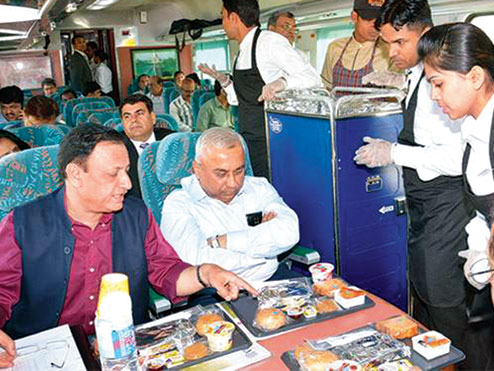
New Delhi, July 21: Government auditors have caught up with passengers long familiar with the perils of ordering from railway kitchens or the platform food kiosks.
A Union government audit report released in Parliament today observes that the railways are not effectively using checks and controls to ensure that pantry cars and kiosk contractors serve quality food, and in the prescribed helpings.
The audit found pantry staff in at least 22 trains, including three terminating in Calcutta, using unpurified tap water to prepare coffee, tea or soup despite water purifiers being available. The base kitchen serving a Kanpur-New Delhi-Kanpur train used the railways' general water supply for cooking.
Across multiple other stations and trains, passengers received slightly lower-than-due quantities of ice cream, curd or pooris, or were served stale milk, sweets with fungal growth or other food that failed quality tests.
Audit teams from the comptroller and auditor general's office had collaborated with railway officials to inspect 74 stations and 80 trains across India between July and October last year to assess the catering services.
The joint inspections revealed that before being served to passengers, food lay unprotected from flies, insects and dust at Agra, Pathankot and Titlagarh stations and on four trains: the Ajmer-Sealdah Express, Bikaner-Coimbatore Express, Nizamuddin-Goa Express and the Nizamuddin-Sampark Kranti Express.
The 22 trains where unpurified water went into soup and beverages included the Kolkata Rajdhani, Howrah-Ranchi Shatabdi and the Howrah-New Jalpaiguri Shatabdi.
Cockroaches and rats infested the pantry cars of the New Delhi-Sealdah Duronto and the Nizamuddin-Chennai Duronto. Flavoured milk with expired shelf life was sold at Bokaro Steel City station, and unsold parathas lying in a base kitchen for Kanpur trains were likely to be recycled to passengers.
"Such findings are not surprising; the regular travellers know this," said Omkarnath Tiwari, president of the Railway Passengers Association in Vadodara, an organisation of about 1,000 regular train passengers.
"Despite inspections by the railways themselves, the actions taken are weak. They might replace one contractor with another but the quality of catering doesn't change. It will not unless they impose severe penalties."
The audit report has listed several examples of "unfair practices in catering services", with passengers receiving smaller portions than they ought to.
On the Sealdah Rajdhani, passengers received 17gm of almonds instead of 20gm; the Howrah-Ranchi Shatabdi served 90gm dal instead of 100gm.
Elsewhere, passengers received 90ml ice cream and curd in cups instead of 100ml, the contracted quantity. At the food plaza at Gwalior station, the audit inspectors found pooris weighing 130gm instead of the stipulated 175gm.
Nine trains with run times of over 24 hours lacked pantry cars. In seven of these trains, neither were train-side vendor services provided nor was any base kitchen nominated to help the passengers procure food during the journey.
These seven are: The Bandra Terminus-Dehra Dun Express, Bilaspur-Ernakulam Superfast Express, Jabalpur-Somnath Express, Kamakhya-Ranchi Express, Gorakhpur-Lokmanya Tilak Terminus Express, Lokmanya Tilak-Visakhapatnam Express and the Gwalior-Baroni Express.
The report has urged the railways to improve their monitoring and ensure that effective controls are in place to stop unfair practices, such as serving less than the prescribed quantity of food.
In February, the railway ministry had announced a new catering policy that mandated the Indian Railway Catering and Tourism Corporation to "un-bundle" or divide the responsibilities of food preparation and food distribution, set up new kitchens, upgrade the existing kitchens and introduce full accountability for food quality.











